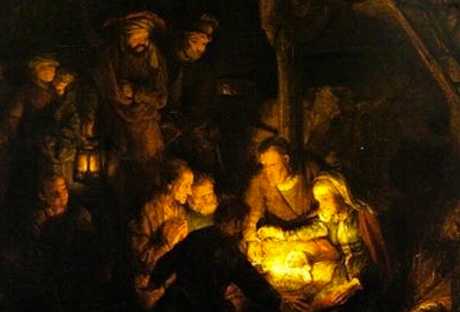
Memories embedded with romantic pictures of Jesus' birth are quite impossible to rewrite. Retold by Christmas pageants, reminded by carols and pictures replenish what we think happened at Jesus' birth. I know it so well I hardly need a sermon, picture, movie or song to remind me of a pregnant Mary riding a donkey, about to deliver; a village with inns filled to capacity; a kindly innkeeper finding a stable for rest; shepherds arriving at a barn to welcome the Christ-child.
The overall narrative has it right, but the core assumption is so wrong as to miss an essential part of the story.
What is wrong with that picture? First, the 'inn' was not as we imagine – a place where you could rent a room for the night. Such hardly existed. Even more wrong is to assume that Joseph returning to the place of his ancestors would be treated thus by relatives, especially in a culture which prides itself for hospitality.
So what do we make of the popularized 'inn' ubiquitously spoken of Christmas after Christmas from Luke 2: "because there was no room for them in the inn.'?
Translators, artists and poets assumed the Greek word (katalyma) meant 'inn' or a commercial place for over-night travellers. Here words matter. They simply got it wrong. The word meant a spare bedroom for family friends and visitors. Ken Bailey, Middle East scholar, reminds us it was often an upper room in village homes reserved for visitors. When Luke wanted to make it clear that a building was really an Inn for travellers, he used a special Greek word as in the story of the Good Samaritan – (pandocheion) as in Luke 10. When he meant a guest room – as in Luke 22 – he used the same word as the place Mary and Joseph stayed, a guest room, as told in the Christmas story of Luke 2.
So what then was the stable? Village homes in Palestine consisted of two rooms: one the guest room or "inn" and the other the family room where family lived: worked, cooked, ate and slept. At the end of that room, there was another space, often at a lower level, designated for family animals: possibly a cow, a donkey and a few sheep. Animals brought in over night were for their protection from wild animals and thieves, then in the morning led into a courtyard and the room or stable cleaned. When Mary and Joseph arrived, with the guest room in use – remember there was a census and many people travelled back to the region to register – there was only one place for them to stay which was the manger at the end of the house: While it was a place for animals, it was in the house of a relative.
Why does this matter? Because the world in which Jesus was born, while tough, primitive and hostile with an occupying Roman army, it was a world of family. Jesus was born into the lineage of David, a Hebrew Testament promise. He did not come unwanted, refused entry into an overcrowded inn. As son of a distinguished family, homes opened and his parents welcomed with the best they had to offer. It was no disgrace to nestle in the straw of a manager. Clean straw, in a loving home, protected by immediate and distant family marked the introduction of the Christ-child.
This welcoming makes a sharp break with King Herod who learns of Persian nobles looking for the "King of the Jews." When verified by Hebrew scholars, he sends his men to Bethlehem to kill an estimated twenty children under two, which eerily marks the collective experience and now memory of this Christmas.
The contrasting stories of a loving welcome and a vicious murder provide framing of the life of Jesus. Within these two opposites the Messiah foretold centuries earlier, now enters the human race, raised by loving parents in Nazareth, eventually overridden by the religious and political/military machines of his day.
What then do we do with this story? Its historic retelling provides a picture and occasion so we might also warmly welcome this king into our personal and collectives lives.
Full Story: Christmas Eve – The Misnomer of an Overcrowded Inn
Source:Christian Post


